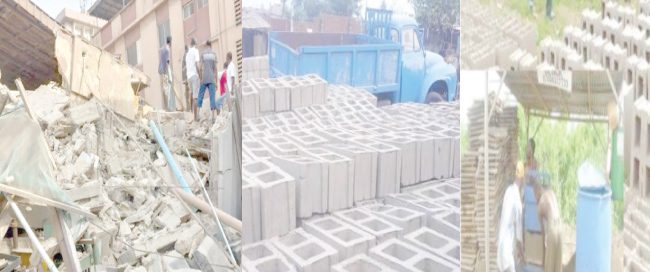The proliferation of substandard sandcrete blocks in the Nigerian housing sector has become a growing concern for practitioners, home builders, and contractors.
Unlike the situation 35 to 40 years ago, particularly during the construction of Jakande estates in Lagos State where buildings were constructed without columns or pillars due to the superior quality of sandcrete blocks, today’s blocks crumble under pressure during construction.
Substandard sandcrete blocks, available in six and nine-inch sizes, dominate the market despite their high prices. Producers blame the high cost of cement and sand/stone dust for the decline in quality. However, reports indicate that most manufacturers have tampered with the standard molds and abandoned the correct sand-cement-water ratio, reducing the strength of the blocks and making them prone to breaking during transportation and usage at construction sites.
Mrs. Iyabo Abiola, a trader in Ketu’s fruit market, expressed her dissatisfaction after 30 out of 1,000 blocks purchased from a factory in Alapere crumbled during offloading. She criticized the lack of standards and supervision in the industry, attributing the proliferation of substandard blocks to profit-driven practices and the absence of enforcement by government agencies.
Similarly, Mr. Isaac Adeyemi, a landlord in Ibafo, Ogun State, lamented discovering cracks across his newly completed shopping complex, which he later learned were caused by substandard blocks. He had to incur additional expenses to patch the walls. In Ogba, Tunde Awolusi reported that his fence collapsed three weeks after construction due to the use of poor-quality blocks.
The Building Collapse Prevention Guild (BCPG), government agencies, and other stakeholders have mobilized to address the issue. During a forum titled “Grassroots Advocacy Against Building Collapse,” they called for intensive public awareness and stricter enforcement of standards for sandcrete block production. Attendees included officials from the Lagos State Materials Testing Laboratory (LSMTL), the Standards Organisation of Nigeria (SON), built environment practitioners, traditional rulers, community leaders, and the National Association of Block Moulders of Nigeria (NABMON).
The event featured a practical demonstration of standard sandcrete block production. Key speakers emphasized the need for collaboration, enforcement of standards, and an attitudinal change among block producers. The General Manager of LSMTL, Mrs. Olayinka Abdul, highlighted the alarming statistics of building collapses in Nigeria, stressing the economic and emotional toll these incidents take on communities. She urged producers to prioritize quality over cost, despite fluctuating material prices.
Mrs. Abdul detailed the role of the LSMTL in upholding sandcrete block quality through rigorous testing and providing technical advice to producers. She advocated for exploring alternative materials that meet quality standards without increasing costs.
The Director-General of SON, Chukwunoso Okeke, acknowledged the challenges facing the construction industry due to fluctuating production costs. He reiterated the importance of adherence to standards such as the Nigerian Industrial Standard (NIS 587:2000), which specifies the requirements for the composition, dimensions, and compressive strength of sandcrete blocks. SON has intensified collaboration with stakeholders through awareness campaigns, compliance monitoring, and laboratory testing to enhance block quality.
Faith Oko-Ukoni, Chairperson of the Nigerian Institution of Civil Engineers, Lagos State Chapter, emphasized that quality sandcrete blocks require a precise mix of materials and adherence to strength and durability standards. She noted that commercially available blocks often fall below the minimum compressive strength requirement, posing significant risks to construction projects.
Industry leaders and stakeholders called on producers to prioritize public safety over profit, warning that failure to address the production of substandard blocks would lead to more building collapses and further erosion of trust in the construction sector.



